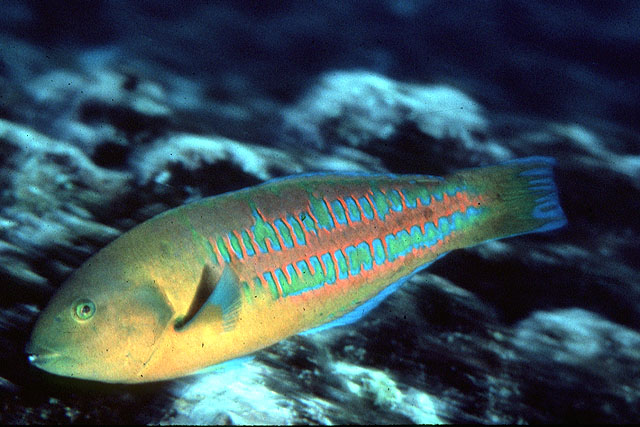| Labridae (Wrasses), subfamily: Corinae |
| 30 cm TL (male/unsexed) |
|
reef-associated; marine; depth range 0 - 10 m |
| Indo-Pacific: East Africa to the Pitcairn, north to the Ryukyu Islands, south to Tonga and Rapa. |
|
Dorsal spines (total): 8-8; Dorsal soft rays (total): 13-13; Anal spines: 3-3; Anal soft rays: 11-11. This species is distinguished by the following characters: greatest body depth 2.7-3.6 in SL; pectoral fin rays usually 16; lateral line scales 25; total gill rakers on first gill arch 17-24 (modally 20); caudal fin of initial phase slightly rounded to truncate, of terminal males truncate to slightly double emaginate; Body of initial (female) phase greenish grey to pale green with 5-6 dark saddles on back, pair of dark (sometimes diffused) stripes on side, a dark vertical line on most scales of body, and with a diagonal (or C-shaped) pink to dark red below front of eye; while body of terminal male salmon-pink to orange anteriorly, with 2 longitudinal series of vertical green rectangles, every fourth pair of upper series extending as a single green bar across back, the head orange-brown without bands and caudal fin brownish to greenish, shading distally to pink, the posterior third of rays blue (Ref. 9823, 86689, 90102). |
| Found solitary or in groups (Ref. 90102) in shallow exposed reef flats, usually with rock-base and mixed coral and algae (Ref. 48636, 58302). Also occurs in surge-swept reef flats, reef margins, and clear rocky shorelines, but may venture to deeper waters up to 10 m (Ref. 3921). Benthopelagic (Ref. 58302). Feeds on crustaceans (especially crabs), mollusks, and ophiuroids (brittle stars) (Ref. 3921). |
|
Least Concern (LC); Date assessed: 07 March 2009 Ref. (130435)
|
| harmless |
Source and more info: www.fishbase.org. For personal, classroom, and other internal use only. Not for publication.
